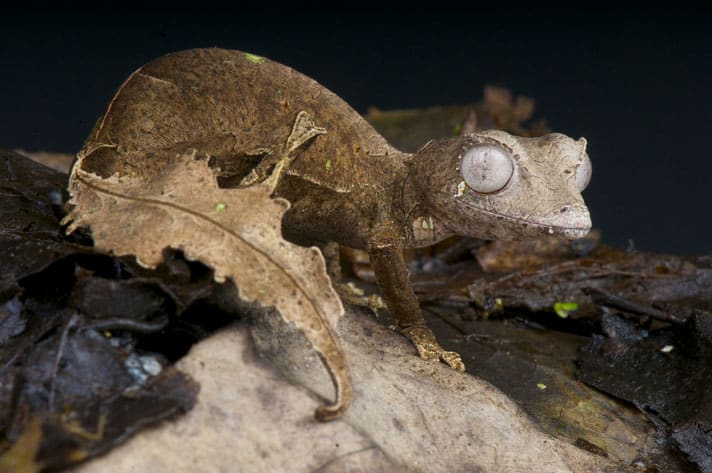Updated February 3, 2023 Satanic Leaf tailed gecko (Uroplatus phantasticas) There are few geckos as bizarre and as fascinating as the satanic le
Updated February 3, 2023
Satanic Leaf tailed gecko (Uroplatus phantasticas)
There are few geckos as bizarre and as fascinating as the satanic leaf-tailed gecko (Uroplatus phatantasicas), also referred to as “Phants” for short. These geckos’ remarkable ability to mimic a leaf has captivated reptile hobbyists for decades. Originally described by George Albert Boulenger in 1888, Uroplatus phantasticas occurs in the tropical forests of the central to north east coast of Madagascar.
Availability
After years of being rather readily available through regular exports from Madagascar, these geckos have recently become rather difficult to locate due to smaller export quotas from Madagascar and the few number of dedicated hobbyists consistently reproducing them. They are rarely offered for sale at reptile shows or online reptile stores. In this care sheet we mention recommended products and husbandry techniques to ensure reptile health and wellness!
Size
Determing the sex of phantasticas is rather simple. Typical of many gecko species, male phantasticas develop a clear hemipenal bulge at the base of their tail at around 5-6 months in age. Also phantasticas are sexually dimorphic in that males typically have a tail that resembles a leaf that has been predated on by insects more so than females who typically have a tail resembling a fresh leaf. However, this does not always hold true. Males typically attain a slightly smaller size than females, usually weighing in at between 4-6 grams. Females can attain 8-9 grams in weight.
Life Span
Satanic leaf-tailed geckos are capable of living longer than 10 years.
Caging
Compared with other species of Uroplatus, phantasticas are one of the easier species to accommodate. Due to their smaller size a single adult can be housed in an enclosure measuring 10″ x 10″ x 20″ (LxWxH). Pairs and trios can be housed in slightly larger enclosures. I use cages measuring 12″ x 16″ x 20″ for breeding pairs and trios. However, larger cages can certainly be used. I have used screen cages, partially screened cages, reptile terrariums, and customized Sterilite plastic container bins to house phants.
When furnishing the tank and thinking about lizard habitat products, it’s important to utilize as much vertical space as possible. Often times I see people buy a tall enclosure, yet the top 1/2 to 1/3rd of the enclosure is just left as dead space, rather defeating the purpose of a tall enclosure. I find a simple way to optimize all available cage space is to plant live plants in the enclosure. I typically use ficus trees and pothos fine, as these plants are hardy, grow quickly, and are available at nearly any place that sells tropical pants. Once grown into the enclosure they will maximize every inch of the enclosure and provide numerous climbing and hiding places for animals. In addition to the plants I also use a lot of thin (about the diameter of a pencil) bendi-vine, which I run vertically throughout the enclosure to provide more climbing opportunities for the animals.
Lizard Lighting, Temperature and Humidity
Uroplatus phantasticas require cool temperatures and high humidity (65-100%). Ambient daytime temperatures ranging from 72-78 degrees are ideal, with nighttime temperatures between 60-65 degrees. You can use a reptile thermometer and reptile hygrometer to monitor these conditions.
Lizard Substrate
For substrate, 2-3 inches of moist peat moss or sphagnum moss works well. They both can hold a lot of water without turning soggy and can help maintain air humidity. Both options are commonly available at garden centers and are cheap enough that you can replace the entire bedding when needed.
Food
The bulk of my phantasticas diet consisted of appropriately sized crickets and roaches (Blatta lateralis). Snails are essential for breeding animals. All insects should be dusted in a calcium/multivitamin.
Water
A water dish can be provided, however nightly mistings are usually enough.
Handling and Temperament
Handling should only be done if absolutely necessary; they do best when left alone.
Derek Dunlop has bred over 100 reptile species and maintained a large collection of Uroplatus species. With a Bachelors degree in Ecology/Evolutionary Biology he currently travels the world assisting in fieldwork and photographing reptiles and amphibians in the wild.



